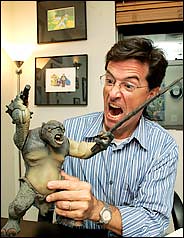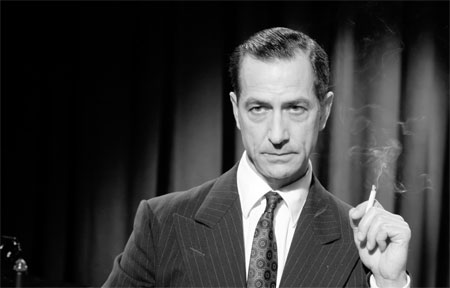“Even as the State Department and the United States Agency for International Development pay contractors millions of dollars to help train journalists and promote a professional and independent Iraqi media, the Pentagon is paying millions more to the Lincoln Group for work that appears to violate fundamental principles of Western journalism.” According to today’s NYT and in keeping with the Dubya administration’s penchant for rigging the media, it appears the Pentagon has been paying for planted propaganda in Iraqi newspapers. “‘You show the world you’re not living by the principles you profess to believe in, and you lose all credibility.‘”
Tag: Media
2nd Time Around.
Meanwhile, the investigations continue. This weekend, Time reporter Viveca Novak announced she’s cooperating with Plamegate prosecutors, who have been asking her about her conversations with Robert Luskin, Karl Rove’s attorney, beginning in 2004. Doesn’t sound like Rove is off the hook, does it? Update: Apparently, Novak was Rove’s alibi: “‘This is what caused [Fitzgerald] to hold off on charging’ Rove, the source said. But another person familiar with the conversations said they did not appear to significantly alter the case.“
All the President’s Men.
Washington Post editor Bob Woodward testifies to the Fitzgerald grand jury about a third senior White House official involved in disclosing the identity of Valerie Plame, besides Libby and Rove. (Woodward’s statement.) This means Libby likely wasn’t the first to leak Plame’s identity, but the new info has no bearing on his perjury or obstruction of justice indictments.
For Woodward’s part, his statement and public comments about the case alternate between high dudgeon (“It was the first time in 35 years as a reporter that I have been asked to provide information to a grand jury”) and open ridicule (“When I think all of the facts come out in this case, it’s going to be laughable because the consequences are not that great.“) Mostly, he just seems cranky that he — award-winning journalist Bob Woodward! — was forced to take time away from another puff piece book on Dubya to testify about a felony in the White House. But this isn’t news. Frankly, Woodward has been embarrassing his legacy for years…almost any of his talking-head stints on Larry King illustrate that. Since at least the early Clinton years, he’s been more desirous of maintaining his high profile and insider status than in promoting good journalism or good government. (And in that, he’s reflected the trajectory of many in the newsmedia.) Update: The Post is somewhat irked.
Grey Lady Down.
“Even before I went to jail, I had become a lightning rod for public fury over the intelligence failures that helped lead our country to war…I believed then, and still do, that the answer to bad information is more reporting.” To no one’s surprise, Judy Miller “retires” from the New York Times, but not before getting in one last word (and setting up her own website.) Well, she was way wrong on WMD, but she’s right about this: The best thing the NYT can do to restore its credibility after Judy and Jayson Blair would be to lead an investigatory charge into the pre-war Iraq intelligence, and pronto.
Hard Time Killing Floor Blues.
Republicans…they never stop surprising me. The nation discovers that, contrary to our most basic principles, the CIA has a series of secret, illegal gulags around the world, and how do GOP leaders respond? They want to know who told the press. (Mind you, this is after stonewalling investigations into prewar intelligence and the Plamegate leak for many a year.)
To be fair, not all GOP Senators are with them on this. Said Gang of 14 member Lindsey Graham (R-SC): “Talk about not seeing the forest for the trees. The real story is those jails…I’d like to know why we’ve got secret prisons and what oversight precautions we have.” And Trent Lott (R-MS) believes that a Republican is likely responsible for the leak, after hearing about the prisons from Mr. Torture himself, Big Time Dick Cheney. “‘Every word that was said in there went right to the newspaper,’ Lott said. ‘We can’t keep our mouths shut.‘” But, perhaps Catkiller knows this, and suspects one of his probable primary opponents? (LA Times story via Quiddity.) Update: Wheels within wheels…Was the leak investigation letter accidentally leaked? Regardless, Pat Roberts has put the kibosh on a congressional investigation…for now.
Times for a change.
“After President Bush’s disastrous visit to Latin America, it’s unnerving to realize that his presidency still has more than three years to run. An administration with no agenda and no competence would be hard enough to live with on the domestic front. But the rest of the world simply can’t afford an American government this bad for that long.” The NY Times editorial staff come out swinging against Dubya.
From CPB to APB?
A day after a report by the Inspector General on his tenure (and his questionable use of agency money), Kenneth Tomlinson, he of the axe to grind with Bill Moyers, resigns as chairman of the Corporation for Public Broadcasting. “Jeffrey Chester, executive director of the Center for Digital Democracy, an advocacy group, said: ‘It was time that Mr. Tomlinson stepped down. He has engaged in unethical, if not illegal, behavior.’” But don’t jump for joy just yet, Buster: Even with Tomlinson gone, conservatives still rule the roost at CPB.
Let the Gravitas Begin.

“No, this program is dedicated to you, the heroes!…And who are the heroes? The people who watch this show — average, hardworking Americans. You’re not the elites, you’re not the country club crowd. I know for a fact that my country club would never let you in. But you get it! And you come from a long line of it-getters!” Reviews come in grippy for the first installment of The Colbert Report, Comedy Central’s answer to The O’Reilly Factor. His opening monologue (at the official site) is well-worth watching.
MillerTimes.
“Greg Mitchell, who edits Editor & Publisher, writes, ‘Miller did far more damage to her newspaper than did Jayson Blair, and that’s not even counting her WMD reporting, which hurt and embarrassed the paper in other ways.’ Jay Rosen concurs. ‘There’s no question,’ he says, ‘this is bigger than Jayson Blair.'” Salon‘s Farhad Manjoo deconstructs the NY Times coverage of Judy Miller’s involvement in Plamegate (available here), and explains why Cheney chief Lewis Libby, in particular, may now be facing an obstruction of justice charge. If it’s any consolation, Scooter, Rove’s in hot water, too.
Exhuming McCarthy.

While perhaps a bit too black-and-white in terms of the history, George Clooney’s Good Night, and Good Luck is nevertheless a somber and captivating paean to Edward R. Murrow, his televised expose of Joe McCarthy, and, by extension, the Pioneer Days of Television Journalism. (In this last regard, it’s somewhat reminiscent of the excellent Clooney-produced live TV version of Fail Safe a few years ago.) It’s also assuredly a smoother, subtler, and more accomplished bit of muckraking than, say, Tim Robbins’ recent and lamentably over-the-top Embedded. Once again displaying the surprisingly strong directorial sense he exhibited in Confessions of a Dangerous Mind, Clooney also benefits here from a smartly written script which refuses to talk down to its audience, the crisp black-and-white cinematography, and quality performances across the board. As a result, what could have been an above-average History Channel documentary is instead a powerful and intelligent work of cinema that’s easily one of the better films out this year.
Admittedly, as Jack Shafer pointed out in Slate, Good Night, and Good Luck is rather narrowly focused, and works better as an impassioned and articulate morality play than it does as sound history. The Murrow of this film is saintly to a fault (although David Straitharn ameliorates this with a sardonic and multifaceted performance that may well get some nods come award time.) And there’s very little historical context offered herein, either for the origins of the McCarthy hysteria or for the Wisconsin Senator’s ultimate downfall, which had more to do with picking a fight with the army than with the Murrow broadcast.
That being said, I really like the way Clooney uses archival footage in this film. For one, Clooney was clever to follow Murrow’s example and let Joe McCarthy hoist himself on his own petard. Having the real McCarthy excoriate Murrow as the “leader of the jackal pack” gives the film a sense of history (and menace) that an actorly turn couldn’t have provided. For another, Clooney, who definitely appears to have done his homework, is unafraid to cut to real historical footage — the Annie Lee Moss hearings, for example — for extended periods, and just let the inherent drama of the real proceedings speak for itself. As a result, the history feels alive and contemporary, no mean feat when so many other historical films seem to use the past as merely exotic window dressing. Could the film have been more nuanced in its appraisal of both Murrow and McCarthyism? Undoubtedly. (Then again, nuanced appraisals weren’t exactly McCarthy’s strong point, either., nor is it a long suit of his current defenders.) But on the whole, Good Night, and Good Luck is, I think, a worthy exercise in historical filmmaking, and one with some obvious relevance in light of today’s entertainment-addled, sideshow-obsessed news media.
Movie-wise, there are a few small problems. I think the GN, & GL should have done either more or less with Robert Downey, Jr. and Patricia Clarkson as Wershbas Joe and Shirley — their particular plight doesn’t tie in to the rest of the story very well. And, while Ray Wise is good as the broadcaster-at-wits-end Don Hollenbeck, he’s also typecast in my mind — I kept expecting him to break into the Leland Palmer dance. All in all, though, Good Night, and Good Luck manages to enliven both the staid television studios of Fifties CBS and this historical moment with smoky jazz, languishing cigarettes, and ominous shadows. As the show says, see it now.
